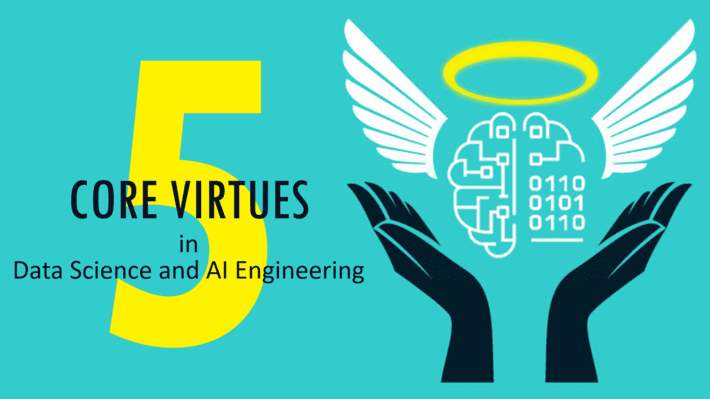 Virtues should be digitized. As we speed toward reliance on machines to process more and more information and provide cognitive support for all types of decision-making, we must consider ways to imbue automated processes, data machinations and recommender systems with a sense of some of the finest human virtues.
Virtues should be digitized. As we speed toward reliance on machines to process more and more information and provide cognitive support for all types of decision-making, we must consider ways to imbue automated processes, data machinations and recommender systems with a sense of some of the finest human virtues.
We are at the crossroads of a moral decision in artificial intelligence (AI) — what I call the codification of virtue (or not) — to address historic biases and impose just standards for reality bent on fair data and decision-making that seeds an ever better world. Otherwise, we will fail to jettison anachronistic social norms and business practices that are the antithesis of virtuous intelligence, independent flesh or silicon.
The Greek philosopher Epictetus said, “It is impossible for a man to learn what he thinks he already knows.” This is particularly relevant in AI and among its engineers, inasmuch that the system or human that is creating a system must be thoughtful, methodical and explicit in how they embed an algorithm. A machine will not and, in fact, cannot do this of its own accord.
This has been a common shortfall I’ve had to address throughout projects I’ve led, programs and teams I’ve developed, and solutions that my teams have delivered. So now, I will codify five points for the quant (which is a term I use liberally to include data scientists, artificial intelligence engineers, machine learning engineers, data miners, statisticians, and other neighboring skills) to remember.
I submit that the following five core virtues should be as explicitly practiced as they are codified by the AI. It’s necessary to consider these as both soft and technical terms that are compelling, if not compulsory, for both the quant and the AI.
1. Resilience
Both the quant and the AI must:
• Adapt to situations and recover quickly.
• Engineer conditions that explore the full solution space and feasible scenarios available.
• Account for the effects of local constraints and overcome such conditions to mitigate premature stopping.
2. Humility
Both the quant and the AI must:
• Take responsibility for results.
• Continually learn and adapt with reinforcement learning.
• Recognize and engineer outcomes that appreciate how little can be known or controlled.
3. Grit
Both the quant and the AI must:
- Avoid getting stuck admiring the problem or preoccupied developing the smartest solutions.
- Be obsessed with being productive and getting stuff done in new and innovative ways.
- Provide auditable and interpretable results.
4. Liberal Education
Both the quant and the AI must:
- Welcome and work with complexity, diversity and change.
- Review opportunities or business problems critically, analyzing data fully and considering feasible methods to formulate solutions.
- Communicate clearly, cleanly and reasonably with documentation that develops healthy and accountable solutions for society.
5. Empathy
Both the quant and the AI must:
- Recognize and account for social impact and the feelings of others.
- Develop objective functions or constraints based on understanding and compassion.
- Identify interdependence and direct connections with a higher purpose or consciousness.
Being Intentional About AI
I’ve explicitly noted that each virtue falls on the shoulders of both the quant and the AI itself. This is to show it is as much the responsibility of the solution as it is the author to emulate the attributes of resilience, humility, grit, liberal education and empathy.
AI will free up human thinking, but it should not excuse us from thought or virtue. We cannot afford or risk a world where AI is filled with all the virtues we despise. Let’s be intentional about developing it and ourselves with all the virtues we instead admire.
